War forgives no one. From those battling on the field to those praying in their homes, the impact of war is both terrifying and unforgettable. As most survivors recount, the scars, be it emotional or physical, never fully fade.
As many historical accounts of World War II mention, the psychological, emotional, and physical aftermath of war extend far beyond the battlefield, creeping into everyday life and changing the future of entire generations.
There is no doubt in accepting that it takes grit and perseverance to survive a war. However, this journey is not without the painful memories of trauma, sacrifice, and loss.
Lost Family and Friends
One of the heaviest burdens to bear after the war is the haunting absence of those who didn’t make it. War rips families apart, manifesting untold stories that echo in the hearts of those left behind.
Survivors like young Ida, left as an “heir” at only sixteen, represent countless children who faced sudden, inexplicable losses. In Sara and Wilbur Pierce’s epic book, Jews Have Horns, An Anthology of Antisemitism, Ida recounts her school days as:
“I should have been focusing on Wolfgang Goethe and reciting the verses of Roslein, Roslein, Roslein Rot, Roslein auf der Heiden (Wild Rose, Wild Rose in the Heather), but instead, I was transformed in an instant into an unwelcome foreigner. I was enmeshed in a class that I always considered a heaven and in which I spent seven years.”
Ida’s discovery of her home in disarray and her parents being taken away imprinted a lifetime of grief on her. Overnight, the bright teenager becomes a solitary soul, bearing the weight of being an unfortunate heiress at just 16 years of age.
Living Through and After the Trauma
Beyond the immediate violence and confusion, survivors face another battle: the mental and emotional one. They struggle to disregard the horrid memories and continue with their regular life.
The silence of once-bustling Jewish communities, the painful gaps in family trees, and the constant reminders of loved ones who vanished overnight make moving forward even more impossible.
Those like Fannie Sonkin, who survived Cossack Raids by hiding under floorboards, carried the trauma of persecution and near-death experiences throughout their lives.
The Uncomfortable Realities of Adjustment and Identity
Survival not only meant enduring the war but also adjusting to the post-war world, which often felt alien. Sara and Wilbur Pierce have collected several such stories in their remarkable Jewish anthology, including the children saved through Kindertransport Programs. It was more of a secret service that helped 10,000 children get out of war-ridden Germany.
Although saved from death, these children now had to grow up in entirely foreign environments, isolated from their cultural heritage and lost to a familiar identity.
The Burden of Unseen Battles
Surviving soldiers returning home also faced a different war upon their return. The sights and sounds of the horrific war left them reliving memories that couldn’t be forgotten.
Even those physically removed from war zones, like Sara Pierce’s family in the U.S., shared in the stress and tension, constantly aware of their fragile safety.
The searchlights over American skies, the worry over air raids, and the tuned-in voices of radio announcers became reminders that they, too, were affected by the anxiety and pain of war.
Finding Faith and Hope Amidst the Ruins
Amid despair, survivors have consistently found faith and hope to be essential lifelines. Many have continued to embrace religious or cultural practices, protecting the remnants of what had been lost.
Their determination is perhaps most evident in the quiet acts of defiance, like the Jewish war survivors who built a synagogue in a factory, found solace in prayer, or simply dared to plan for a future in the face of systemic hatred.
Those who survived were often buoyed by these acts, using them to rebuild themselves and move forward, even in societies that might not fully understand their pain.
The Legacy of War Survivors
War survivors carry a complex legacy.
They possess the strength to overcome incredible hardships yet remain constant witnesses to the horrors endured. Their resilience is inspiring, forged in fire, and marked by conflict.
The legacy of these survivors reminds us that the real cost of war is paid long after the last battle is fought. It is to influence generations and compel the world to remember, honor, and respect.
Jews Have Horns: An Anthology of Antisemitism is a collection of such stories from World War II highlighting the Jewish experience in the face of oppression and discrimination.
Through tales of cultural preservation, familial bonds, and defiance, the anthology sheds light on how Jewish communities strove to maintain their identities despite forced relocations, German atrocities, and constant fear of survival.
Get your copy now. The book is available on Amazon.





